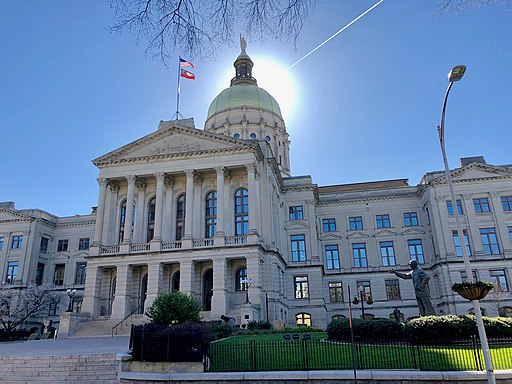Tag: georgia
-
Six candidates running in U.S. Senate Republican primary election in Georgia

Six candidates are running in the Republican Party primary election for U.S. Senator from Georgia on May 24, 2022. Gary Black, Kelvin King, Latham Saddler, and Herschel Walker have led in fundraising and media attention. Josh Clark and Jonathan McColumn are also running. NPR‘s Domenico Montanaro said, “Walker, a former Heisman-winning University of Georgia Bulldog…
-
Calvin Smyre, longest-serving member, resigns from Georgia state House

Calvin Smyre (D) announced on April 4, 2022, that he would resign from the Georgia House of Representatives, after being appointed ambassador to the Dominican Republic by President Joe Biden (D). Smyre has served since 1975, most recently in District 135. Smyre was elected to the state House in 1974. He is the longest-serving Georgia…
-
Georgia legislature votes to refer two measures to the ballot during 2022 legislative session

The Georgia State Legislature voted to refer a constitutional amendment and a state statute to the 2022 ballot during the final days of the 2022 legislative session. The legislature adjourned from its 2022 session in the early morning hours of April 5. The constitutional amendment, passed unanimously in both chambers, would authorize local governments “to…
-
Georgia enacts new state legislative district maps

Georgia enacted new legislative districts on Dec. 30, 2021, when Gov. Brian Kemp (R) signed a proposal approved by the legislature into law. The maps will take effect for Georgia’s 2022 state legislative elections. On Nov. 9, the Georgia State Senate passed a map redrawing the state’s 56 Senate districts in a 34-21 vote, which…
-
Two incumbent Democrats to face each other in U.S. House primary in Georgia
Incumbent Reps. Carolyn Bourdeaux and Lucy McBath each won congressional districts in Georgia previously held by Republicans. McBath (6th District) is running for re-election in the newly drawn 7th District, which pits her against Bourdeaux in the Democratic primary. Daily Kos wrote that Bourdeaux currently represents about 57% of the new 7th District, while McBath…
-
Dickens defeats Moore in Atlanta mayoral runoff election

City Councilman Andre Dickens (D) defeated City Council President Felicia Moore (D) in the general runoff election for mayor of Atlanta, Georgia, on Nov. 30, 2021, receiving 64% of the vote to Moore’s 36%. Incumbent Mayor Keisha Lance Bottoms (D) announced on May 6, 2021, that she would not seek re-election, making her the first…
-
Baldon and Jones win Atlanta Public Schools runoff elections

Runoff elections for District 2 and At-Large District 7 of the Atlanta Public Schools (APS) school board took place on Nov. 30, 2021. Aretta Baldon defeated Keisha Carey in the runoff election for the District 2 seat, 50.6% to 49.4%. Tamara Jones defeated KaCey Venning in the runoff for the At-Large District 7 seat, 66.9%…
-
Runoff elections for Atlanta Public Schools districts to be held Nov. 30

Runoff elections for District 2 and At-Large District 7 of the Atlanta Public Schools school board will be held on Nov. 30, 2021. Aretta Baldon and Keisha Carey advanced to a runoff election for the District 2 seat, while Tamara Jones and KaCey Venning advanced to a runoff for the At-Large District 7 seat. Nine…
-
Redistricting timeline update: Georgia begins special session, New Hampshire and Ohio redistricting efforts delayed

Here’s a summary of recent redistricting updates from Georgia, New Hampshire, and Ohio. Georgia: The Georgia State Legislature convened for a special session focused on redistricting on Nov. 3, 2021. Senate Majority Leader Mike Dugan (R) said he expected the legislature to agree on and pass state legislative maps quicker than congressional maps. “[State legislative…
-
Andre Dickens and Felicia Moore advance to a runoff election for Atlanta mayor

Andre Dickens and Felicia Moore advanced to a runoff election following the general election for mayor of Atlanta on November 2. Incumbent Keisha Lance Bottoms announced on May 6 that she would not seek re-election, making her the first Atlanta mayor since World War II to choose not to run for a second term Since…

